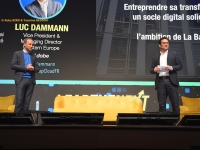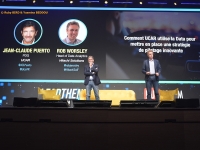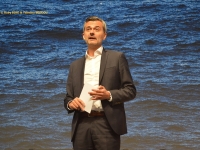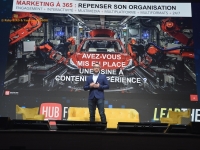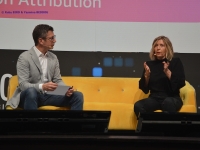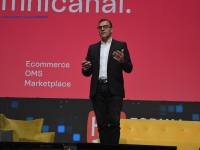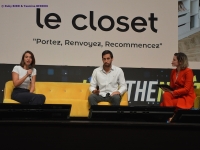Business
LEAD THE NEXT ECONOMY - UNIQUE EVENT IN PARIS (HYBRID)
HUB FORUM DIGITAL BUSINESS
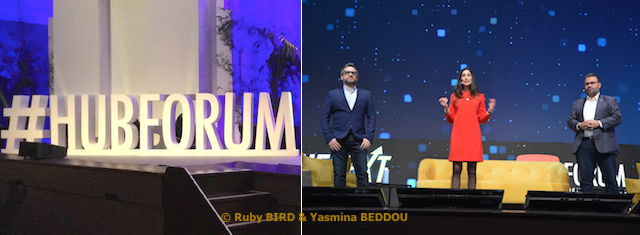
Emmanuel VIVIER, Perle BAGOT & Vincent DUCREY (Source: © Ruby BIRD & Yasmina BEDDOU)
USPA NEWS -
The coronavirus crisis is a world-changing event. Dealing with it and its aftermath could be the imperative of our times. It is impossible to know what will happen. But it is possible to consider the lessons of the past, both distant and recent, and on that basis, to think constructively about the future. Indeed, for businesses, the prospect of more border restrictions; a greater preference for local over global products and services; the need for resilience across supply chains driving a move to bring sourcing closer to end markets; and perhaps renewed resistance to globalization, are all possible second-order consequences of the actions being taken now to cope with the coronavirus. Technology continues to shrink physical distance, but in other ways, it could be set for a return.
The coronavirus crisis is a world-changing event. Dealing with it and its aftermath could be the imperative of our times. It is impossible to know what will happen. But it is possible to consider the lessons of the past, both distant and recent, and on that basis, to think constructively about the future. Indeed, for businesses, the prospect of more border restrictions; a greater preference for local over global products and services; the need for resilience across supply chains driving a move to bring sourcing closer to end markets; and perhaps renewed resistance to globalization, are all possible second-order consequences of the actions being taken now to cope with the coronavirus. Technology continues to shrink physical distance, but in other ways, it could be set for a return.
Indeed, in the wake of recent natural disasters, the impact of climate change was increasingly being recognized by business leaders and investors, with consequent effects on decision making and valuations. This pressure to include environmental, social, and governance factors in valuing a business is likely to expand to incorporate resilience to outside shocks, such as pandemics.
E-commerce was already meaningfully and visibly eating into the sales of brick-and-mortar stores. What the coronavirus has done is to accelerate a change in shopping habits that was already well established. In effect, it is becoming possible to imagine a world of business in which human contact is minimized. But not eliminated: for many people, getting back to normal will include popping into stores again, and the roadside kiosks typical of much of the developing world are not about to be replaced by cashless hyperstores. Patients with complex needs will still want to see their doctors in person, and many kinds of jobs are not automatable. But the trends are probably irreversible.
The digital economy is now recognised to include all parts of the economy that exploit technological change that leads to markets, business models and day-to-day operations being transformed. So it covers everything from traditional technology, media and telecoms sectors through to new digital sectors. These include e-commerce, digital banking, and even “traditional” sectors like agriculture or mining or manufacturing that are being affected by the application of emerging technologies.
Omnichannel retailing has become the gold standard for success in the retail environment, the goal that everyone is supposed to be aiming for but few know how to achieve. It provides a seamless, continuous customer experience across any device or location a customer wishes to shop, with a personalized brand experience. Developing an omnichannel strategy is a process that businesses embark upon, and that process can be made easier through connectivity.
And that’s because consumers don’t have just one way to interact with your brand any more. There’s a whole range of different channels available at their fingertips to reach out and learn more about your products and services: Google searches, social media, videos, and mobile apps to name but a few.
Data-driven marketing is the approach of optimising brand communications based on customer information. Data-driven marketers use customer data to predict their needs, desires and future behaviours. Such insight helps develop personalised marketing strategies for the highest possible return on investment (ROI)... Today’s consumer journey is more fractured than ever before... With so many different brand interactions happening in each consumer journey, you need to isolate which marketing programs are truly moving the needle and impacting revenue so you can invest more heavily in them.
Blending entertainment with instant purchasing, live commerce offers retailers, brands, and digital platforms a new channel with enormous scope for creating value. Done well, live commerce increases a brand’s appeal and distinctiveness and pulls in additional web traffic. It can strengthen positioning among existing customers and attract new ones, especially young people keen on innovative shopping formats and experiences. In terms of demographics, Generation Z and millennials dominate, although live commerce is starting to attract middle-aged and more-senior consumers.
HUB FORUM DIGITAL BUSINESS 2021 Event was under the Theme "LEAD THE NEXT ECONOMY".
On October 12 & 13, 2021 @ Maison de La Mutualité (Paris). Gathering Decision Makers from the following sectors: Retail, E-Commerce, Banking-Insurance, Tourism, Atomotive, Energy... in search of inspiration, reflection and activation to rethink their post-Covid Business and successfully prepare their 2022 strategy.
On October 12 & 13, 2021 @ Maison de La Mutualité (Paris). Gathering Decision Makers from the following sectors: Retail, E-Commerce, Banking-Insurance, Tourism, Atomotive, Energy... in search of inspiration, reflection and activation to rethink their post-Covid Business and successfully prepare their 2022 strategy.
For more info about the Event:
https://paris.hubforum.com/fr/eventagenda?searchtext=&page=2&%24pagegroup=mardi12octobre
https://paris.hubforum.com/fr/eventagenda?searchtext=&page=1&%24pagegroup=mercredi13octobre
Ruby BIRD
http://www.portfolio.uspa24.com/
Yasmina BEDDOU
http://www.yasmina-beddou.uspa24.com/
https://paris.hubforum.com/fr/eventagenda?searchtext=&page=2&%24pagegroup=mardi12octobre
https://paris.hubforum.com/fr/eventagenda?searchtext=&page=1&%24pagegroup=mercredi13octobre
Ruby BIRD
http://www.portfolio.uspa24.com/
Yasmina BEDDOU
http://www.yasmina-beddou.uspa24.com/
Liability for this article lies with the author, who also holds the copyright. Editorial content from USPA may be quoted on other websites as long as the quote comprises no more than 5% of the entire text, is marked as such and the source is named (via hyperlink).



